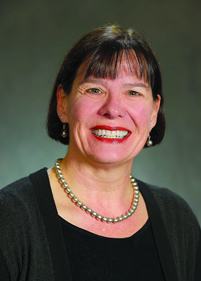
At the beginning of her academic career, Sharon L. Kolasinski, MD, was able to mentor a medical student thanks to the support of a clinical preceptorship from the Rheumatology Research Foundation.
This preceptorship gave Dr. Kolasinski, at the time working as an assistant professor of medicine at the University of Pennsylvania School of Medicine, the opportunity to think about teaching in a different way. She thought about curriculum development, innovations in teacher/student interactions, and the best way to share rheumatology with students.
“I’m a clinician educator who really has had outstanding support from the Foundation in my endeavors to become a better teacher and clinician from the beginning,” said Dr. Kolasinski, who will moderate Innovative Educators, Novel Techniques: A Rheumatology Research Foundation Special Session on Tuesday from 2:30 – 4:00 pm. The session features research conducted by CSE Award recipients.
In 2008, Dr. Kolasinski received the Foundation’s Clinician Scholar Educator Award, which supports educators dedicated to developing new and improved programs to enhance education in musculoskeletal and rheumatic diseases for future doctors and rheumatology health professionals.
“The Foundation’s Clinician Scholar Educator Award permitted me the opportunity to engage with different educators and explore the ways in which we could affect the medical school curriculum, expose more students to rheumatology in different ways, and engage our faculty in fresh ways of teaching,” she said. “It was an extraordinary experience that not only taught me, but also changed the way I was perceived in my own institution.”
Since then, Dr. Kolasinski has gone on to receive more than a dozen awards from the Foundation and share her expertise by reviewing applications for other Foundation grants, all while serving as Professor of Clinical Medicine at Penn and treating patients at the Penn Musculoskeletal Center. The Foundation’s grants gave Dr. Kolasinski affirmation about her career path and the ideas she wanted to explore. The freedom allowed her to expand her knowledge, become more sophisticated in her understanding as a teacher, and receive invaluable recognition for her academic career.
Dr. Kolasinski has hope for future rheumatologists thanks to the Foundation’s support for training. She believes the Foundation is “sustaining the field (of rheumatology) and building the next generation of rheumatologists.
“The Foundation supports us as rheumatologists and we need to support it,” she said. “Together we raise the profile of the entire community of rheumatology.”
As a clinician educator, Dr. Kolasinski values academia and sees the Foundation as one of the few places where support is available for a clinician educator across a breadth of activities and practices.
“The Foundation supports a great diversity of individuals, institutions, programs, and educators,” she said.
